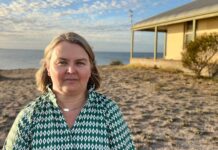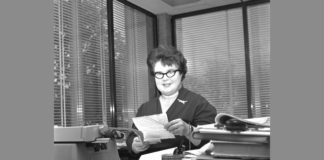Georden West started working at Club Cafe in Boston’s South End the year before the pandemic hit. For the artist, community leader, and educator, this wasn’t just a typical job; it was research for their upcoming film, called “Playland,” about what would be Boston’s oldest gay bar had it not shut down in 1998. But it quickly became much more than that.
“I met my partner on my first night working in this space. I met some of my best friends working in this space,” says West. “It becomes your family and a family system so quickly. I love them all so much and this past year has been incredibly difficult, especially navigating what it means to be a tipped economy worker during a pandemic.”
Nearly 40 percent of LGBTQ people work in industries where they are at high risk of contracting COVID-19, according to a report by the Human Rights Campaign Foundation. Along with other public health crises and gentrification over the last 50 years, this pandemic has hit the LGBTQ community particularly hard. Since 2020 alone, Machine and Ramrod, The Boston Eagle, and inclusive venues like Bella Luna have all announced their permanent closing.
West had been developing an idea about LGBTQ nightclub workers for years. The pandemic shutting everything down made the task of writing the film even more urgent, as they spent the time preparing for production and reflecting on the loss of life and much needed community space.

“We’ve lost so many spaces. And it’s not just Boston, it’s across the United States,” says West. “Playland represents the sort of lost gem of queer life within the 1900s. It’s a warning sign for what can happen to queer nightlife in Boston, should we not be advocating and supporting it and also resisting the sort of government intervention into these spaces.
West was drawn to Playland in particular because it was known to be diverse and welcoming, in contrast to many of the area’s bars that were more segregated and gender restrictive.
“I was doing some digging and came across an archive about a specific drag queen [Sylvia Sidney],” says West. “Reading about her experiences within this particular location just really sparked a creative interest for me.”
Sylvia Sidney was a local institution in her own right, performing throughout New England for more than forty years until her death in 1998. Some say she still haunts Jacque’s Cabaret. She was infamous for her crass, audience-mocking acts in bars throughout Boston’s Combat Zone.
The Combat Zone was Boston’s adult entertainment district. For a stretch of the 20th century, the neighborhood we now call Downtown Crossing was lined with porn theaters, strip clubs, and other establishments that the Boston Redevelopment Authority wanted to keep from spreading, like the gay bars Sylvia headlined her act. Her favorite of those bars was Playland Cafe.

“Prior to the 1960s, the least savory part of Boston had been Scollay square, where there were theaters and arcades and bars, but during urban renewal Scollay Square was demolished to make way for City Hall Plaza,” says Joan Ilacqua, executive director of The History Project, the only organization focused exclusively on documenting, preserving, and sharing the history of New England’s LGBTQ communities. Ilacqua says that the Combat Zone rose up as the adult playland of the city.
Playland Cafe wasn’t designated a gay bar when it opened in 1937, but it quickly gained that reputation.
“After World War II, the military was still concerned about soldiers going to gay bars and basically getting in trouble to be a little euphemistic about it,” says Ilaqua. “So they did a survey of bars in Boston and created a list of bars where military people were not allowed to go and Playland was one of those bars. That’s actually how we know that it was a gay bar pretty early on.”
The Boston Redevelopment Authority wanted to rid the city’s downtown of adult nightlife. Restrictive zoning laws and raids forced many to close and kept others from reopening as the AIDs crisis devastated the community.
Earlier this year, West and I took a walk through the neighborhood, which is now unrecognizable from its days as the Combat Zone. We started at 21 Essex Street, the former site of Playland Cafe. It’s now a parking garage.
“It’s not only the plight of Playland, but it was the plight of all those businesses that were downtown, and the sort of undesirables that were congregated there,” says West. “They were forced out and torn down so that a different population could populate the downtown area.”

West’s depiction of Playland takes a lot of liberties and isn’t a historic representation but rather a memorial to these lost spaces and the people who occupied them. With limited dialogue and dreamlike attention to visuals, it bounces in time between two servers who share the same locker decades apart.
“I wanted to make it more of a dream or a memory of someone who loved the space.”
They’re shooting the film in early fall, with a cast that includes drag icon Lady Bunny, and Danielle Cooper from FX’s Pose. Cooper says she was immediately drawn to the film because of the way it pays homage to a lost cultural institution.
“We’re tearing down places that have shaped and transformed various communities and cities. In the term of the LGBTQIA space, black and brown spaces, like it feels like it’s constantly happening,” says Cooper. “This is our opportunity to say, look, this place existed, and these were the powerful people that helped shape the community in Boston. Just because the space is gone does not mean they can erase us.”
West left the job at Club Cafe for good last winter because of concerns about COVID. They’re excited about spaces reopening, and the long awaited prospect of in-person art and entertainment, but they say it’s bittersweet.
“Things are reopening now, but we’ll never get to go to Playland,” says West. “I get to rebuild the space for this one night only kind of vibe. But Playland, like countless bars across the United States right now, will never have another Friday night.”







